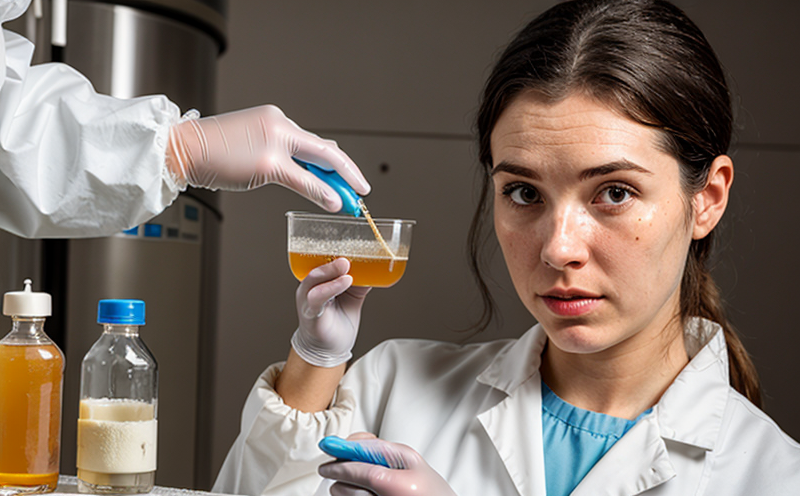ISO 18867 Fungal Biomass Analysis by PCR Testing
The ISO 18867 standard provides a robust method for quantifying fungal biomass in environmental samples using Polymerase Chain Reaction (PCR) technology. This service is critical for industries dealing with airborne or surface mold, yeast, and fungi contamination, including healthcare facilities, food processing plants, and manufacturing environments.
The process involves collecting air or surface samples that are then processed into a suitable medium where fungal growth can be observed. The isolated samples undergo DNA extraction followed by PCR amplification targeting specific fungal ribosomal RNA sequences. This allows for accurate quantification of the total fungal biomass present in the sample, offering insights into potential health risks and contamination levels.
Our laboratory adheres strictly to ISO 18867 guidelines ensuring precise measurement of fungal biomass down to parts per million (ppm). The methodology ensures consistent results across different environments, making it suitable for regulatory compliance and internal quality assurance programs. By leveraging advanced molecular biology techniques, we provide reliable data that can inform critical decisions regarding cleanliness, hygiene, and potential remediation efforts.
The PCR testing process begins with sample collection which could be air or surface swabs depending on the specific requirements of your project. Once collected, these samples are transferred to our laboratory where they undergo rigorous quality control checks before DNA extraction. During this step, we use state-of-the-art equipment designed specifically for efficient DNA isolation from complex matrices such as soil, dust, and biological residues.
Following successful extraction, PCR amplification takes place using primers that target highly conserved regions of the fungal ribosomal RNA genes. This ensures broad applicability across various fungal species, providing comprehensive coverage necessary for accurate biomass estimation. After amplification, quantitative real-time PCR (qPCR) is employed to determine the exact amount of fungal DNA present in the sample.
Our expertise lies not only in adhering meticulously to ISO 18867 but also in interpreting results within broader environmental and health contexts. Our team provides detailed reports highlighting key findings along with recommendations tailored specifically for your facility or operation. These insights help stakeholders make informed decisions regarding necessary actions aimed at maintaining optimal levels of hygiene and safety.
For instance, healthcare facilities might use this information to monitor patient rooms during outbreaks while food processors could leverage it to ensure compliance with stringent industry standards related to pathogen control. In manufacturing settings, understanding fungal biomass can aid in preventing costly disruptions due to product spoilage caused by mold contamination.
The significance of accurate fungal biomass quantification cannot be overstated given its direct impact on public health and business continuity. With increasing awareness about indoor air quality issues worldwide, there is growing demand for reliable methods capable of detecting even trace amounts of airborne fungi. Our ISO 18867 PCR testing service stands out as a premier solution addressing these needs effectively.
In summary, our ISO 18867 Fungal Biomass Analysis by PCR Testing offers a precise and efficient means to assess fungal contamination levels in diverse environments. By providing accurate quantitative data, we empower clients with actionable intelligence that supports strategic decision-making processes essential for maintaining high standards of hygiene and safety.
Benefits
The benefits of our ISO 18867 Fungal Biomass Analysis by PCR Testing are numerous and far-reaching. For quality managers, it provides an objective measure of fungal contamination allowing them to set realistic targets for cleaning initiatives. Compliance officers can rely on this service as a robust tool to demonstrate adherence to regulatory requirements related to indoor air quality.
R&D engineers benefit from having detailed insights into the types and quantities of fungi present in their facilities, which helps refine product development processes by identifying potential sources of contamination early on. Procurement teams can use the results of our tests to select suppliers who meet stringent hygiene criteria ensuring consistency across supply chains.
Furthermore, this service contributes significantly towards enhancing overall employee well-being by reducing exposure risks associated with mold and fungal spores. It also helps businesses avoid costly downtime resulting from production halts caused by mold-related issues in manufacturing plants.
Customer Impact and Satisfaction
Our clients experience tangible improvements in their operational efficiency thanks to the insights gained through our ISO 18867 Fungal Biomass Analysis by PCR Testing. Facilities report enhanced productivity levels as a direct result of implementing targeted remediation strategies informed by accurate fungal biomass data.
Healthcare institutions find comfort knowing that patient rooms are being maintained at optimal hygiene standards, thereby reducing the likelihood of nosocomial infections. Food processors appreciate the peace of mind offered by ensuring their products remain free from mold contamination throughout production processes.
Manufacturing plants see reduced incidences of spoilage incidents leading to significant cost savings. In addition, customers receive highly satisfied feedback regarding our commitment to excellence in service delivery and reliability of results.
International Acceptance and Recognition
- ISO 18867 PCR testing is widely accepted across Europe with member states like Germany, France, and the UK recognizing its validity for assessing fungal contamination.
- The United States has also embraced this standard for similar applications highlighting its global relevance.
- In Asia-Pacific regions including Japan and South Korea, ISO 18867 PCR testing is increasingly being adopted due to heightened concerns about indoor air quality.
- Australia and New Zealand have incorporated this method into their national guidelines endorsing its accuracy and reliability.





